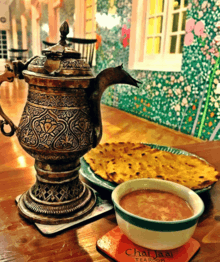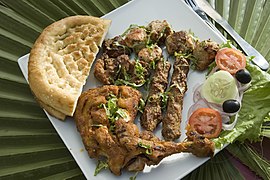Noon chai
Noon chai, also called shir chai (from Persian, meaning 'milk tea'), gulabi chai, Kashmiri tea or pink tea,[1] is a traditional tea beverage, originating from the Indian Subcontinent, most probably from the Kashmir Valley, made with gunpowder tea (green tea leaves rolled into small balls), milk and baking soda.[2]
 | |
| Alternative names | Kashmiri tea, shir chai, gulabi chai, pink tea |
|---|---|
| Place of origin | India, Pakistan |
| Associated national cuisine | Kashmiri |
| Main ingredients | gunpowder tea, milk, soda, salt or sugar |
Etymology
The word noon means 'salt' in several Indian languages such as Kashmiri, Bengali, Rajasthani, Hindi and Nepali.[3] It is used in several other terms, such as the noon-dab ("salt promise") custom of Rajasthan, where a hand is dipped in salt to signify a solemn promise.[4]
Preparation
Noon chai is traditionally made from a type of green tea leaves, milk, salt, baking soda and usually cooked in a samavar.[5] A pinch of baking soda gives it a pronounced pink color. Sugar is not traditionally used in Kashmiri home recipes, although newer commercial preparations in Indian and Pakistani restaurants and tea stalls may include sweetener.
Noon chai is served in many states of India usually in Northern India (Jammu and Kashmir, Himachal Pradesh) and areas with even small Tibetan population such as Mainpat, Chhattisgarh. In Pakistan, it is often served with sugar and nuts (for non-Kashmiris who are not acquainted with salty tea),[5] at special occasions, weddings, and during the winter months. Noon chai is an essential part of Kashmiri breakfast and supper, It is consumed with various types of traditional bread made in Kashmir. Kashmiri chai or Kashmiri tea is pink, milky and creamy and is usually garnished with a sprinkling of chopped almonds and pistachios.
Major Servings
Noon chai is usually served at breakfast time in Kashmir Valley. People prefer to take tea instead of taking any fruit or vegetable for breakfast. Kashmiri bread is served along with the tea and with butter also. In Muharram congregations of Kashmir, mourners prefer to take noon chai (pink tea) before entering into the ritual of mourning. Tea is poured from Samovar, and bread is served along. The tea served in muharram congregations is believed to be more strong and salty, so that mourners remain cautious in night time and don’t sleep while mourning.
See also
References
- "NOON CHAI / SALTY TEA / PINK TEA – KASHMIRI NAMKEEN CHAI". Life 'n' Such. April 16, 2007. Archived from the original on 8 February 2014. Retrieved 17 February 2014.
- "Sheer Chai Recipe". Archived from the original on 2012-07-06.
- Bengali and English dictionary. Oxford University. 1856. Retrieved 2014-11-22.
... নূণ Salt ...
- Edward Balfour (editor) (1873). Cyclopædia of India and of Eastern and Southern Asia, Volume 4. Scottish & Adelphi presses. Retrieved 2014-11-22.
... Noon-Dab, Hind., from Noon or loon, salt, and dabna, to dip, bespatter, or sprinkle, a custom among the Rajput races, of dipping the hand in the salt; the Noon-dab, is the most sacred pledge of good faith ...
CS1 maint: extra text: authors list (link) - "Noon Chai Recipe and History at Life-n-Such". Lifensuch.com. 2007-04-16. Archived from the original on 2014-02-08. Retrieved 2012-03-04.
6. Life of a Notable Kashmiri by Abid Bashir
